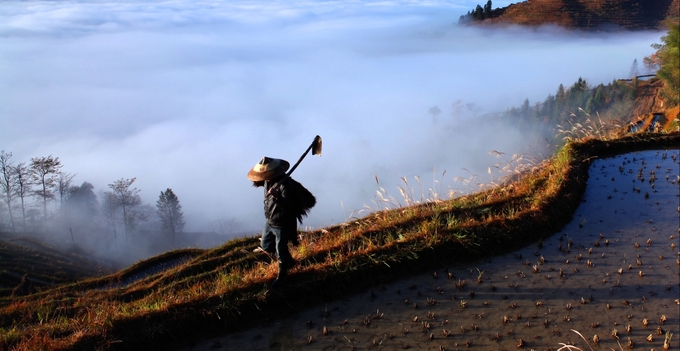May 29, 2025 | 15:58 GMT +7
May 29, 2025 | 15:58 GMT +7
Hotline: 0913.378.918
May 29, 2025 | 15:58 GMT +7
Hotline: 0913.378.918

A farmer in China’s Ziquejie Terrace rice system.
The benchmark for world food commodity prices declined in December compared to the previous month, with the sharpest drop in international sugar quotations, the Food and Agriculture Organization of the United Nations (FAO) reported Friday.
The FAO Food Price Index, which tracks monthly changes in the international prices of a set of globally-traded food commodities, averaged 118.5 points in December, down 1.5 percent from November and down 10.1 percent from December 2022.
For 2023 as a whole, the index was 13.7 percent lower than the average value over the preceding year, with only the international sugar price index higher over the period.
The FAO Cereal Price Index increased 1.5 percent from November, as wheat, maize, rice, and barley prices all rose, partly reflecting logistical disruptions that hindered shipments from major exporting countries.
For the year as a whole, the index was 15.4 percent below the 2022 average, reflecting well supplied global markets, although FAO’s All Rice Price Index (part of the FAO Cereal Price Index) registered a 21 percent increase, largely owing to concerns about the impact of El Niño on rice production and in the aftermath of export restrictions imposed by India.
The FAO Vegetable Oil Price Index by contrast, declined by 1.4 percent from November, reflecting subdued purchases of palm, soy, rapeseed, and sunflower seed oil, with soy oil in particular impacted by a slowdown in demand from the biodiesel sector as well as improving weather conditions in major growing areas of Brazil. For 2023 as a whole, this index was 32.7 percent below the previous year’s level.
The FAO Sugar Price Index declined 16.6 percent from November, hitting a nine-month low although still up 14. 9 percent from December 2022. The plunge in sugar quotations was mainly driven by the strong pace of production in Brazil, along with reduced use of sugarcane for ethanol production in India.
The FAO Meat Price Index dipped 1.0 percent from November, reaching a level 1.8 percent below that of December 2022, impacted by persistent weak import demand from Asia for pig meat. Regional buying interest also slowed for bovine and poultry meat despite ample exportable supplies in large producing regions. Ovine meat prices by contrast rose ahead of holidays.
Bucking the trend, the FAO Dairy Price Index increased by 1.6 percent from November, although still standing 16.1 percent below its December 2022 value. The monthly increase was led by higher price quotations for butter and cheese, underpinned by strong internal sales in Western Europe ahead of the holiday season. At the same time, strong global import demand led international whole milk powders to rise.
(FAO.org)

(VAN) Vikas Rambal has quietly built a $5 billion business empire in manufacturing, property and solar, and catapulted onto the Rich List.

(VAN) Available cropland now at less than five percent, according to latest geospatial assessment from FAO and UNOSAT.

(VAN) Alt Carbon has raised $12 million in a seed round as it plans to scale its carbon dioxide removal work in the South Asian nation.

(VAN) Attempts to bring down the price of the Japanese staple have had little effect amid a cost-of-living crisis.

(VAN) Fourth most important food crop in peril as Latin America and Caribbean suffer from slow-onset climate disaster.

(VAN) Shifting market dynamics and the noise around new legislation has propelled Trouw Nutrition’s research around early life nutrition in poultry. Today, it continues to be a key area of research.

(VAN) India is concerned about its food security and the livelihoods of its farmers if more US food imports are allowed.